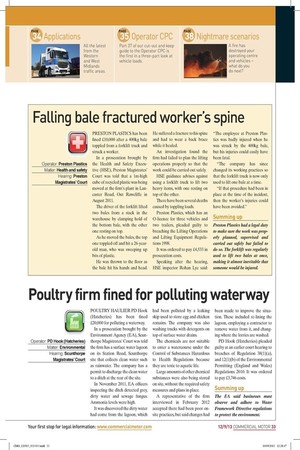Poultry firm fined for polluting waterway
Page 22

If you've noticed an error in this article please click here to report it so we can fix it.
POULTRY HAULIER PD Hook (Hatcheries) has been fined £20,000 for polluting a waterway.
In a prosecution brought by the Environment Agency (EA), Scunthorpe Magistrates' Court was told the firm has a surface water lagoon on its Station Road, Scunthorpe site that collects clean water such as rainwater. The company has a permit to discharge the clean water to a ditch at the rear of the site.
In November 2011, EA officers inspecting the ditch detected grey, dirty water and sewage fungus. Ammonia levels were high. It was discovered the dirty water had come from the lagoon, which
had been polluted by a leaking skip used to store egg and chicken remains. The company was also washing trucks with detergents on top of surface water drains.
The chemicals are not suitable to enter a watercourse under the Control of Substances Hazardous to Health Regulations because they are toxic to aquatic life.
Large amounts of other chemical substances were also being stored on site, without the required safety measures and plans in place. A representative of the firm interviewed in February 2012 accepted there had been poor onsite practices, but said changes had
been made to improve the situation. These included re-lining the lagoon, employing a contractor to remove water from it, and changing where the lorries are washed.
PD Hook (Hatcheries) pleaded guilty at an earlier court hearing to breaches of Regulation 38(1)(a), and 12(1)(b) of the Environmental Permitting (England and Wales) Regulations 2010. It was ordered to pay £3,746 costs.
Summing up
The EA said businesses must observe and adhere to Water Framework Directive regulations to protect the environment.









































